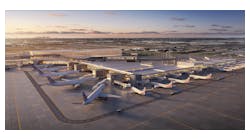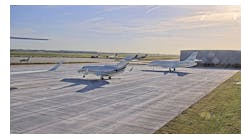Nov. 04--Most of the nation's major airlines have been fading heat for tacking on fees for everything from checked baggage to inflight meals. It's a marketplace up there in the friendly skies, and that kind of criticism comes with the territory. They're big enough to take care of themselves.
But the airlines deserve a word of support, and they're getting it from many quarters, in fending off a couple of burdensome new taxes that the Obama administration has concocted to pay for its American Jobs Act.
The administration is pushing a $100 per flight tax for commercial, cargo and general aviation, a move that would cost $11 billion over 10 years. It also seeks to increase the passenger security tax from today's minimum of $2.50 per customer per flight segment to $7.50, which would cost nearly $25 billion over 10 years.
Adding these taxes would hit the industry hard at a time when it is already dealing with high fuel costs and a mind-boggling array of 17 unique federal aviation taxes and fees in the U.S., which totaled $16.5 billion in 2010.
A study done for the industry concludes that the proposed taxes, if added, would result in the loss of nearly 10,000 direct passenger and cargo airline jobs and cost the entire economy 181,000 jobs in 2012 alone. Some of those would be Houston jobs. And we all know that many if not most of the costs would get passed along to passengers.
What kind of job creation is this? It's not. It's more like job destruction. We urge Congress to refuse to go along.
Continental's nameplate is quickly morphing into United, and the new mega-airline formed by the merger is headquartered in Chicago. But Houston is still an airline city.
George Bush Intercontinental is the new United's largest hub, and William P. Hobby airport hosts an enormous Southwest Airlines presence.
It's interesting to recognize a larger Houston story in the Obama administration's approach to finding new revenue sources for federal spending: Energy is the single largest driver of the U.S. economy, and yet the administration has that essential business in its cross hairs for heavier taxation. Aviation is third behind farming as an economic driver, and now the White House has targeted the airlines and general aviation, too.
Houston is the nation's energy capital and a major player in aviation. So, these are both major Houston stories. Both taxes proposed for the aviation industry would put a hit on the local economy.
Our major industries deserve better treatment than this, Mr. President. They're too important to the nation and the struggling national economy to be treated like piggy banks by the federal government.
Copyright 2011 - Houston Chronicle




